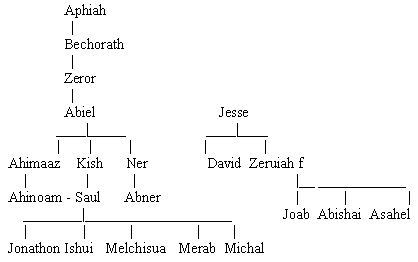|
June
28
|
Reading 1 - 1Samuel 9
Peter Cresswell
Peter Cresswell
v.1 - This part of a family tree of the house of Saul and others involved in the intrigue of Saul and David helps to show the relationships between the house of Saul and the house of David.

The tree
is compiled using the following passages:
1
Samuel 8:1 1 Samuel 14:49 1 Samuel 14:51 1 Samuel 14:50 2 Samuel 2:18
Peter Forbes
Peter Forbes
Peter Forbes
Reading 2 - Isaiah 53
Peter Cresswell
Peter Cresswell
Peter Forbes
Whilst we are familiar with the way that 53:7-8 is quoted in Acts 8:3 we should be aware that this chapter is quoted often - here are some occasions.
|
Who
… revealed
|
Romans
10:16 John 12:38
|
|
|
He
hath born our griefs and carried our sorrows
|
Matthew
8:17
|
|
|
All
we like sheep have gone astray
|
1
Peter 2:25
|
|
|
He
opened not his mouth
|
Mark
15:61 etc
|
|
|
He
is brought … living
|
Acts
8:32
|
|
|
neither
was any deceit in his mouth
|
1
Peter 2:21
|
|
|
many
|
Matthew
20:28 26:28
|
|
|
bear
their iniquities
|
1
Peter 2:24
|
|
|
poured
out his soul
|
Leviticus
6:15
|
|
|
Numbered
with the transgressors
|
Mark
15:28 Luke 22:37
|
|
|
bare
the sin
|
John
1:29 Hebrews 9:28
|
|
|
make
intercession
|
Romans
8:26,27,34
Hebrews 7:25 |
Peter Forbes
God, in his love for us, who are dying because of our sins, gave us Jesus as the perfect sacrifice for our sins. Jesus overcame sin and did not deserve all he got, but he took our punishment to condemn sin and to revoke the curse of sin and death we have inherited from Adam .
If you or I could live a sinless life Jesus would not have had to die He died for us - for you and me. "He took up our infirmities," "He carried our sorrows," "He was pierced for our transgressions," "He was crushed for our iniquities," "The punishment that brought us peace was upon him," "By his wounds we are healed," "We have gone astray," "The LORD laid on him the iniquity of us all," "He bore the sin of many."
The man who did so much for us deserves all we can give. What do you give?
Robert Prins
balanced that with Song of Solomon 5:10-16 ending with 'he is altogether lovely'. The difference to me
is in how the bride of Christ sees him, and how the world sees him.
Jean Cheetham
Reading 3 - Revelation 15 & 16
Peter Cresswell
15 v.3 - There are three references to a song which Moses wrote [Deuteronomy 31:22 30 32:44] This song was delivered to those who had survived the wilderness journey and were about to enter the land of promise. How fitting that the redeemed, at the end of their wilderness probation, should sing the Song of Moses. may it be that we so number our days [Psalm 90:12] that we wills sing that song of Moses.
16
v.15 - The
brethren and sisters knew that Jesus would come 'as
a thief' because Jesus told his disciples as much in the Olivet prophecy.
[Matthew
24:43] Confirming
that they knew the 'times
and the seasons' Paul reminds them that they are not in darkness.
[1
Thessalonians 5:4]
In a similar way Peter [2
Peter 3:10]
reminds his Jewish audiences that despite apparent delays the destruction
of Jerusalem will take place. Jesus is taking up his own warning [Revelation
3:3 16:15]
giving two warnings to his disciples lest they become complacent.
Peter Forbes
|
the
tabernacle of the testimony
|
Exo
40:6,9
|
|
|
and
the ... was filled with ... the glory of God ... and no ... was
able to enter into the
|
Exo
40:35
|
The two quotations from Exodus highlight the tabernacle which was a pattern (Exodus 25:40 Hebrews 8:5) is to have it's fulfilment when the kingdom of God is established.
|
and
every living soul
|
Gen
1:22
|
The quotation
from Genesis 1 highlights the universal nature of the judgement of the
second vial.
Peter Forbes
|
And
they sing the song ... Moses
|
Exo
15:1
|
The song of Moses was sung after Egypt had perished in the Red Sea and Israel had been delivered from death in Egypt. It is typical of our deliverance from sin and death.
|
great
earthquake
|
Eze
38:19
|
|
|
such
as was not since men were upon the earth
|
Dan 12:1
|
Without
this linking in Revelation of Ezekiel 38 and Daniel 12 we might be forgiven
for thinking that Ezekiel is not speaking of events around the return
of Christ and the resurrection. However the fact that John, by the Spirit,
links them provides us with the certainty of the link.
Peter Forbes